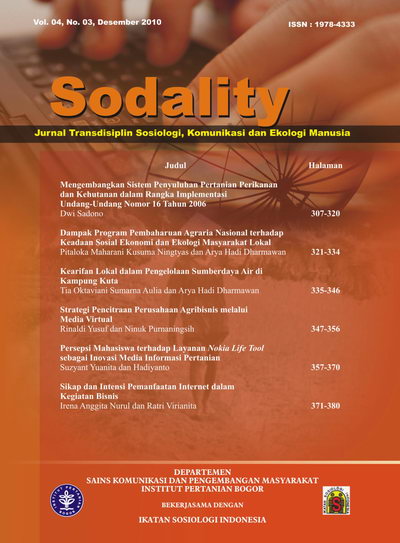MENGEMBANGKAN SISTEM PENYULUHAN PERTANIAN, PERIKANAN, DAN KEHUTANAN DALAM RANGKA IMPLEMENTASI UNDANG-UNDANG NOMOR 16 TAHUN 2006
Abstract
The enactment of Law 16/2006 on System of Agricultural Extension, Fisheries and Forestry may be marked as the new era in agricultural extension development of Indonesia. It is realized so far, that there has been no significant progress to that issue since the extension service had been administratively shifted from the central government to regional authority. Lack of local authority commitment on funding the extension services has made agricultural extension activities remained undeveloped during the years. With Law 16/2006, extension services gained sufficient legal-basis to be undertaken and thus financed by regional authority. This article is part of study to see sub-systems of extension, i.e. extension policy, agricultural extension, research and inspection, special education/official duty, and training. These sub-systems build up an integrative extension system that determines the success of agricultural extension mission at large. This writing tries to elaborate how better functional interconnection among those sub-systems could help increase the effectiveness of agricultural extension activities in the field.
Published
2010-12-09
How to Cite
SadonoD. (2010). MENGEMBANGKAN SISTEM PENYULUHAN PERTANIAN, PERIKANAN, DAN KEHUTANAN DALAM RANGKA IMPLEMENTASI UNDANG-UNDANG NOMOR 16 TAHUN 2006. Sodality: Jurnal Sosiologi Pedesaan, 4(3). https://doi.org/10.22500/sodality.v4i3.5841
Section
Articles
Authors who publish with this journal agree to the following terms:
- Authors retain copyright and grant the journal right of first publication with the work simultaneously licensed under a

This work is licensed under a Creative Commons Attribution 4.0 International License. that allows others to share the work with an acknowledgement of the work's authorship and initial publication in this journal. - Authors are able to enter into separate, additional contractual arrangements for the non-exclusive distribution of the journal's published version of the work (e.g., post it to an institutional repository or publish it in a book), with an acknowledgement of its initial publication in this journal.
- Authors are permitted and encouraged to post their work online (e.g., in institutional repositories or on their website) prior to and during the submission process, as it can lead to productive exchanges, as well as earlier and greater citation of published work (See The Effect of Open Access).





.png)









